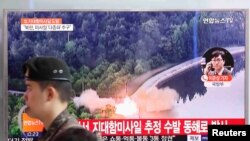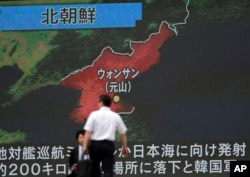North Korea successfully tested a new "ground-to-sea cruise rocket" that is capable of striking enemy battleships staging a military attack, the country's KCNA news agency said Friday.
Pyongyang launched several land-to-sea missiles early Thursday, under the supervision of leader Kim Jong Un, KCNA said.
The missiles "accurately detected and hit the floating targets on the East Sea of Korea," it reported.
The missile test was North Korea's fourth in the span of a month, and comes after the United Nations Security Council imposed new sanctions on Kim's government last week.
The three previous tests were of ballistic missiles, with North Korea appearing determined to develop a missile capable of carrying a nuclear weapon and reaching the U.S. mainland.
U.S. State Department spokesperson Heather Nauert said Thursday the resumption of talks with North Korea on the denuclearization of the Korean peninsula is made more difficult by Pyongyang's increasingly frequent missile tests.
"We hope, at some point, the talks could resume, but we are nowhere near that point," Nauert said.
The latest missile firing came just one day after South Korea suspended the deployment of the U.S. Terminal High Altitude Area Defense (THAAD) anti-missile system.
Nauert said the suspension of THAAD deployment is "part of the conversations" that Secretary of State Rex Tillerson and Defense Secretary Jim Mattis had with President Donald Trump at an Oval Office meeting on Thursday.
"This is a conversation that's taken place at the highest level. We are committed to our South Korean ally. That commitment remains ironclad. We are aware, certainly, of the situation and the suspension of additional launchers," Nauert said.
Seoul said it would delay the installation of remaining components of the THAAD anti-missile system until it completes an assessment of the system's environmental impact.
Under Secretary of State Tom Shannon "affirmed the strength of the U.S.-Republic of Korea alliance" and "the need to sustain close coordination in addressing the threat from North Korea," during his meeting with South Korea's national security adviser Chung Eui-yong on June 1, a spokesperson told VOA.
Trump has called on China to use its relationship as North Korea's chief ally to exert pressure on Kim to rein in his nuclear ambitions.
South Korean President Moon Jae-in said Thursday that North Korea "should immediately halt its nuclear and missile provocations," following a test launch of suspected anti-ship missiles earlier in the day.
"Our government, as I have already clarified multiple times, will not back off at all or compromise regarding national security and people's safety," Moon said. "The government will unwaveringly make efforts for complete denuclearization of North Korea's nuclear weapons through both sanctions and dialogue.
South Korea's Joint Chiefs of Staff said North Korea launched the missiles early Thursday from the eastern coastal town of Wonsan, and that they flew about 200 kilometers before falling into the Sea of Japan.
Rand Corporation defense analyst Bruce Bennett told VOA that the missiles in Thursday's test were probably too small to be able to carry a nuclear warhead.
"These are to demonstrate new capabilities, to suggest that they are advancing and covering new areas, but also to give Kim Jong Un some internal cover from the hits he's taking from the Security Council and elsewhere, from China in particular on their coal import cutoff, trying to demonstrate that Kim Jong Un is still a god, he's still very powerful and capable of doing important things," Bennett said.
Nike Ching at the State Department contributed to this article.







